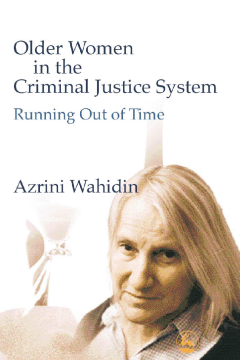
Additional Information
Book Details
Abstract
What is life like for the women who grow old behind bars? Azrini Wahidin examines in-depth the experiences and needs of this overlooked group. What happens to the identity and mental health of these women who are closed off from the outside world and without familial networks? What does it feel like to have to carve out a new version of your private self, in a public space? Wahidin shows how ageist and sexist attitudes in criminal procedures and penal policy regulate and discipline the ageing body. She also highlights the failures of practical provisions in prisons to meet the particular needs of this group. Illuminating reading for all those working in the prison services, probation, and the courts, and an important addition to the wider criminology punishment-rehabiliation debate, Older Women in the Criminal Justice System offers a rare view of what happens to the women who grow old in prison.
Azrini Wahidin is a lecturer of Criminology in the School of Social Policy, Sociology and Social Research at the University of Kent. She has written extensively on gerontology and is a frequent contributor to the media, as well as being a consultant for the Channel 4 documentary, Bus Pass Bandits. She is currently on the management committee for Women in Prison, and on the Executive Council of the British Society of Criminology.
This timely, carefully researched and disturbing book emphasises the need for the government to take urgent action to provide for the distinct needs of all women who become subject to the Criminal Justice System. Imprisonment accelerates the process of ageing. Azrini Wahidin's description of the lack of humanity and decency in the way the increasing number of elderly women are currently treated accentuates the need for a Women's Justice Board to oversee essential improvement.
Sir David Ramsbotham, formerly Her Majesty's Chief Inspector of Prisons
Azrini Wahidin set out to raise awareness of this hitherto forgotten and neglected group by beginning an empirical investigation which eventually produced 35 semi-structured interviews with serving women prisoners aged 50 +. Wahidin's theoretically informed analysis of these interviews constitutes the major part of this timely, sensitive and disturbing book.
Older Women in the Criminal Justice System is as comprehensive in scope as its title implies. It covers older women's courtroom and prison experiences as well as the specific ways in which they are treated by prison personnel, prison health care professionals and other, younger prisoners. There are useful sections on the research methods employed, and some recommendations for much-needed policy changes if the Prison Service is to fulfil its duty of care to these very vulnerable and, in many cases, physically frail women. Best of all, however, there is Wahidin's easy and successful handling of the complex of methodological and theoretical tasks which she set herself... Despite the sadness, melancholy and anger which a treatise on time, loss and penal humanity must provoke, readers will, I think, be as grateful as I am that Azrini Wahidin has produced such a rich and satisfying text. It is a work that should certainly be read by students of criminology, gerontology and sociology, as well as by penal reformers and penal policymakers. Being the very readable and compelling study that it is, however, Older Women should also engage the interest of readers way beyond the confines of academia and criminal justice. Indeed, the universality of the book's major themes may well resonate most painfully with all those aging women (of whatever age and background) who glimpse, in the women prisoners' stories, some of the more unwelcome elements of their own socio-biographies.
British Journal of Criminology
A lecturer in Criminology, Dr Wahidin clearly knows her field and quotes a wide range of sources in her book. This provides a useful insight into the experience and needs of a forgotten group within the criminal justice system.
Prison Service Journal
This reader, which is based on in-depth research with older women in prison, throws light on a much-neglected area, and should be of interest to many in the criminal justice and custodial fields.
Care and Health Magazine
